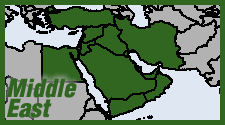 Lebanon, long the Middle East's heartland of hashish, has legalized cannabis cultivation for the medical market—but before the law has even taken effect, rumblings of cynicism are heard from the country's traditional growers. The outlaw growers in the Bekaa Valley, with its centuries-long tradition of hash production, will likely remain illicit and face continued militarized enforcement—while corporate producers with state-of-the-art greenhouses on the urbanized coast dominate the industry. And the hashish market has been hard hit by the country's deep economic crisis, leaving the Bekaa cannabis farmers struggling.
Lebanon, long the Middle East's heartland of hashish, has legalized cannabis cultivation for the medical market—but before the law has even taken effect, rumblings of cynicism are heard from the country's traditional growers. The outlaw growers in the Bekaa Valley, with its centuries-long tradition of hash production, will likely remain illicit and face continued militarized enforcement—while corporate producers with state-of-the-art greenhouses on the urbanized coast dominate the industry. And the hashish market has been hard hit by the country's deep economic crisis, leaving the Bekaa cannabis farmers struggling.
Lebanon this year approved a law that legalizes cultivation of cannabis for medical and industrial purposes, in a bid to boost the country's struggling economy—and curb illicit production. The plan envisions cultivation for pharmaceuticals, CBD oil, and industrial products such as fiber for textiles.
Boasting of the 'best hashish in the world'
The law was passed on April 21 (so 421), despite the opposition of Hezbollah and other powerful cultural-conservative parties. It only affects cannabis that contains less than one percent of the psychoactive compound THC. Nonetheless, the measure is historic, making Lebanon the first Arab nation to legalize cannabis cultivation.
The bill was based on a 2018 report by Manhattan-based consultancy McKinsey & Company, which recommended Lebanon cash in on the burgeoning market for "high-added-value medicinal products with export focus."
Then-economy minister Raed Khoury said a legal cannabis sector in the country could generate $1 billion in annual revenue, and even boasted to Bloomberg that the quality of Lebanese hash is "one of the best in the world."
Yassine Jaber, one of the parliamentarians who pushed for the law, told Al Jazeera: "We have a competitive and a comparative advantage in the cannabis business. Our soil is among the best in the world for this, and the cost of production is low compared to other states."
But no decrim for users
The law now awaits implementation, with a regulatory authority to be established, empowered to issue licenses for cultivation, processing and sale of cannabis and derivative products. Among the law's stated goals is to lift the pressure on Lebanon's overwhelmed criminal justice system by providing a legal outlet for the cannabis trade.
Yet rather than decriminalizing consumption or even reducing sentences, it actually calls for "strengthening criminal penalties on violations against the articles of this law." Between 3,000 and 4,000 people are arrested for drug offenses annually in Lebanon—the big majority for the consumption of hashish, according to stats from the Central Drug Enforcement Office.
The law has drawn criticism from longtime activists, such as Sandy Mteirik of the Lebanese drug-policy reform advocacy organization Skoun. "For sure this is not what the farmers of the Bekaa want," she told Al Jazeera. "There is no clear mechanism to integrate the existing illegal market into the legal market. You can't just ignore the implications and consequences of criminalizing drug use and say this new market is the priority."
Bekaa betrayed
The cannabis-grower militias of the Bekaa Valley, formed to resist eradication forces, in 2015 actually mobilized in collaboration with the security forces to beat back ISIS incursions from across the border in Syria. Their vigilance prevented the self-declared "Islamic State" from establishing a foothold in Lebanon. But they have not been paid back for this heroism.
In recent weeks, both the Los Angeles Times and New York Times filed reports from Yamouneh, a key hashish-producing village in the Bekaa Valley. Residents they spoke to were skeptical and bitter. Ali Shreyf, a village mukhtar or traditional chief, predicted to the LA Times that the cannabis licenses would go exclusively to members of the country's corrupt political elite. "They've stolen everything except for the cannabis," he said. “Now they want that, too.”
Meanwhile, with the COVID-19 pandemic and deep economic crisis in Lebanon, the hashish market is suffering an unprecedented depression. Jamal Chraif, another mukhtar, told the New York Times that many local cannabis farmers were actually switching to apples. "It's over," he said. "Now, growing hashish is a hobby."
As the New York Times notes, the Lebanese pound has lost 80% of its value against the US dollar over the past year, and farmers have taken the hardest hit. The costs of imported fuel and fertilizer have soared, while the Lebanese pounds that growers earn by selling their hashish have been worth less each month.
Enforcement ops unabated
And enforcement operations continue. In April, just days before the law was passed, Lebanon's Internal Security Forces seized some 25 tons of hashish in a convoy of eight trucks bound for Beirut's port. The smugglers escaped and a manhunt was launched. In June, the ISF seized 15 tons and arrested seven men in a raid on a Beirut warehouse. And in October, the ISF raided several greenhouses in the village of Batroun, North Lebanon, destroying some 100 seedlings.
However, it has been years since the government has attempted to carry out eradication operations in the Bekaa Valley, where the growers are armed, organized and proud of their age-old tradition of hashish production. Even with the market now depressed, any effort to eradicate in the Bekaa would likely meet stiff resistance.
Cross-post to Cannabis Now







Recent comments
3 weeks 4 days ago
3 weeks 4 days ago
6 weeks 5 days ago
7 weeks 4 days ago
11 weeks 4 days ago
15 weeks 3 days ago
19 weeks 3 days ago
20 weeks 1 day ago
30 weeks 1 day ago
34 weeks 2 days ago